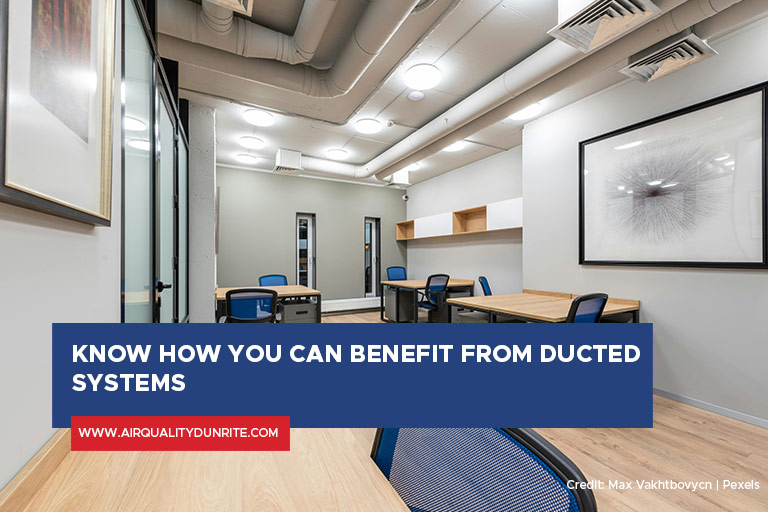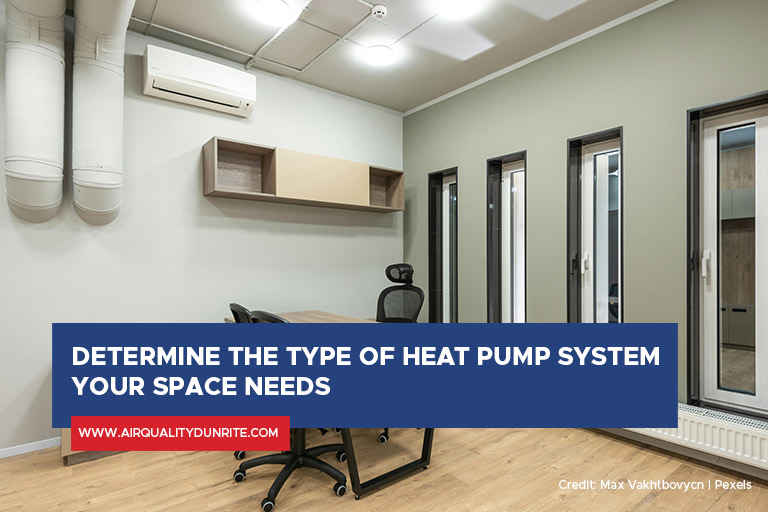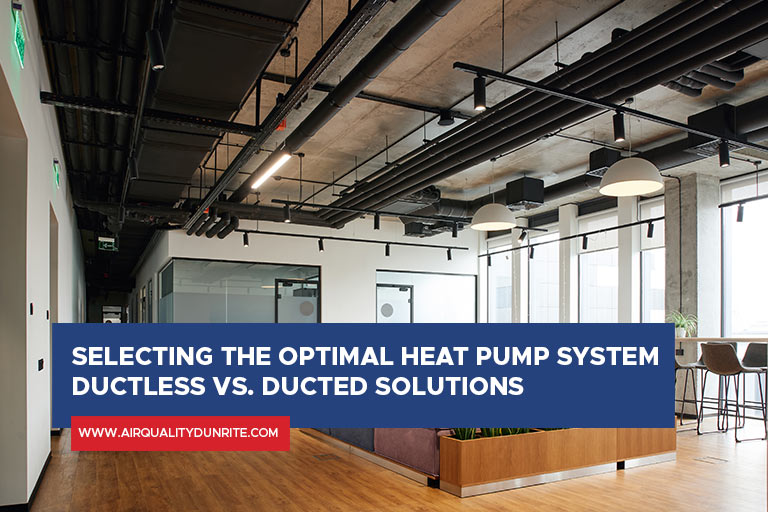Heat pumps are rapidly becoming the go-to choice for climate control in modern homes. They are a versatile and energy-efficient solution for both heating and cooling, making them a sustainable and cost-effective alternative to traditional furnaces and air conditioners. However, when it comes to choosing the right heat pump system for your home, a key decision emerges: ducted vs. ductless.
Understanding the distinct advantages and disadvantages of each system will equip you to make an informed decision that fits your needs and budget.
Ducted Heat Pump Systems

Traditionally, heat pumps have been integrated with existing ductwork systems. Here’s a breakdown of this configuration:
-
Components
A ducted heat pump system consists of an outdoor unit (compressor and condenser coil) and an indoor air handler. The air handler sits within the existing ductwork network, responsible for circulating conditioned air throughout the entire home.
-
Advantages
-
Whole-house conditioning
-
Ducted systems are ideal for uniformly heating or cooling an entire home. This is advantageous if you have consistent temperature preferences throughout your living space.
-
Existing ductwork compatibility
If your home already has existing ductwork, a ducted heat pump can be a simpler and more cost-effective solution compared to installing new ductwork for a ductless system.
-
Cost-effective for large homes
Ducted systems are typically a more cost-effective option for larger homes, as the initial installation cost is generally lower than multiple ductless units.
-
Disadvantages
-
Energy loss
-
Heat loss is a significant concern with ducted systems. According to the National Renewable Energy Laboratory, “Typical systems with ducts in attics or crawl spaces lose from 25% to 40% of the heating or cooling energy that passes through them.” Air travelling through ducts can lose heat in the winter and gain heat in the summer, leading to reduced efficiency. Leaky ducts can further exacerbate this issue.
-
Maintenance
Maintaining a network of ducts requires regular cleaning to ensure optimal performance and prevent dust and allergens from circulating throughout the home.
-
Limited individual room control
Ducted systems typically use a single thermostat to regulate the temperature for the entire house. This can be inconvenient if you have rooms that require different temperature settings.
-
Installation complexity
Installing a ducted system in existing homes can be disruptive, requiring significant construction work to create a network of ducts within walls, ceilings, and floors.
-
Suitability
Ducted heat pumps are well-suited for homes already equipped with functional ductwork, particularly those seeking whole-house comfort control.
Ductless Heat Pump Systems (Mini-Splits)
Ductless heat pumps, also known as mini-splits, offer a more flexible alternative to traditional ducted systems. Here’s what sets them apart:
-
Components
Mini-split systems consist of an outdoor unit and multiple indoor wall-mounted units, each responsible for heating and cooling its designated zone.
-
Advantages:
-
Energy efficiency
-
Ductless systems are generally more energy-efficient than ducted systems due to the absence of energy loss through ductwork. This translates to lower operating costs.
-
Zoned comfort
Each indoor unit can be controlled with its own thermostat, allowing for personalized temperature control in individual rooms. This is ideal for rooms with varying usage patterns or occupants with different temperature preferences.
-
Easy installation
Ductless systems require minimal installation disruption as they only require small conduits connecting the outdoor unit to indoor units. This makes them perfect for existing homes, renovations, and hard-to-reach areas.
-
Improved air quality
Ductless systems have minimal impact on indoor air quality as they don’t recirculate air through a network of ducts that can harbour dust and allergens.
-
Disadvantages
-
Limited to individual rooms
-
While offering better control for specific areas, ductless systems are not ideal for uniform whole-house conditioning.
-
Initial cost
Ductless systems with multiple indoor units can have a higher initial installation cost compared to ducted systems for large homes. However, the energy savings over the long term can compensate for this.
-
Visual aesthetics
Indoor units can be visually conspicuous depending on the style and placement. Consultation with an experienced HVAC professional can help in ensuring optimal placement for both functionality and aesthetics.
-
Suitability
Ductless systems are ideal for homes lacking existing ductwork, new additions, or those seeking targeted comfort control in specific zones. They are also a great consideration for older homes where existing ductwork might be leaky or inefficient.
Choosing the Right System for Your Needs

Several factors should be considered when deciding between a ducted and ductless heat pump system. Here are some key questions to guide your decision:
-
Do you have existing ductwork?
If you have existing ducts, a ducted heat pump can be a good option.
-
Do you need whole-house climate control?
If uniform heating and cooling are crucial, ducted systems might be the way to go.
-
Do you prioritize zoned comfort?
For individual room temperature control, ductless systems are the best solution.
-
What is the size and layout of your home?
Ducted systems are generally more cost-effective for larger homes, while ductless solutions are better suited for smaller residences or those with specific heating/cooling needs for certain rooms.
-
What is your budget?
Consider both the initial installation cost and potential long-term energy savings when comparing the two options.
-
What are your aesthetic preferences?
Ductless systems may be more visually appealing for some homeowners, while ducted systems offer a more traditional look.
Both ducted and ductless heat pumps offer distinct advantages and cater to different homeowner needs. By carefully considering factors such as existing ductwork, desired comfort levels, budget, and home layout, you can make an informed decision that maximizes your home’s comfort and energy efficiency.
Remember, investing in a high-quality heat pump system not only enhances your living experience but also contributes to a more sustainable future.
Air Quality Dunrite: Your Trusted HVAC Partner
At Air Quality Dunrite, we are committed to providing exceptional HVAC services, including expert heat pump installation and repair. Our team of skilled technicians will work closely with you to determine the most suitable heat pump system for your home and ensure seamless installation and optimal performance.
Don’t hesitate to contact us at (416) 342-1939 for a free consultation and personalized recommendations. We are here to help you enjoy the comfort and energy efficiency of a well-chosen heat pump system.



